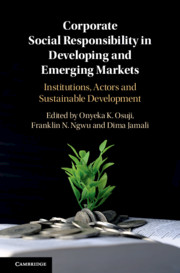 Corporate Social Responsibility in Developing and Emerging Markets
Corporate Social Responsibility in Developing and Emerging Markets from Part III - Normative and Utility Perspectives
Published online by Cambridge University Press: 18 December 2019
Offshoring has become a popular practice for multinational corporations (MNCs), with emerging markets being regarded as attractive locations. Although offshore outsourcing has economic benefits, it also involves several ethical issues, such as poor working conditions, child labour and environmental pollution. To identify implications for how to establish ethical practices in MNCs’ offshoring operations, we discuss theoretical perspectives (i.e., institutional, instrumental and normative) on MNCs’ motivations for being socially and environmentally responsible. Based on a review of these perspectives, this chapter provides practical guidelines for both MNCs and policymakers, including (1) re-designing governance, (2) establishing industry-level action and (3) developing institutional capacity. Developing both public (e.g., government regulation) and private (e.g., corporate code of conduct) governance mechanisms is important. Also, MNCs should take collective action at the industry level. Lastly, MNCs should provide resources and capacity to outsourcing companies and local communities to contribute to alleviating ethical concerns in emerging markets.
To save this book to your Kindle, first ensure no-reply@cambridge.org is added to your Approved Personal Document E-mail List under your Personal Document Settings on the Manage Your Content and Devices page of your Amazon account. Then enter the ‘name’ part of your Kindle email address below. Find out more about saving to your Kindle.
Note you can select to save to either the @free.kindle.com or @kindle.com variations. ‘@free.kindle.com’ emails are free but can only be saved to your device when it is connected to wi-fi. ‘@kindle.com’ emails can be delivered even when you are not connected to wi-fi, but note that service fees apply.
Find out more about the Kindle Personal Document Service.
To save content items to your account, please confirm that you agree to abide by our usage policies. If this is the first time you use this feature, you will be asked to authorise Cambridge Core to connect with your account. Find out more about saving content to Dropbox.
To save content items to your account, please confirm that you agree to abide by our usage policies. If this is the first time you use this feature, you will be asked to authorise Cambridge Core to connect with your account. Find out more about saving content to Google Drive.